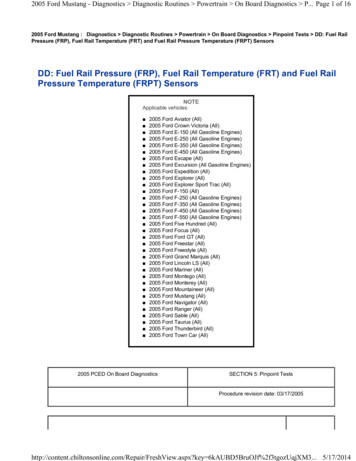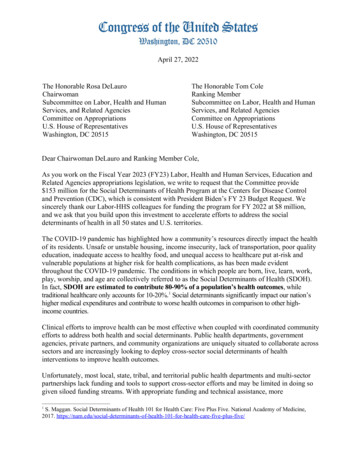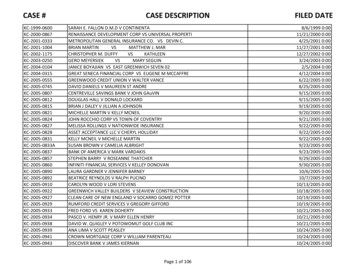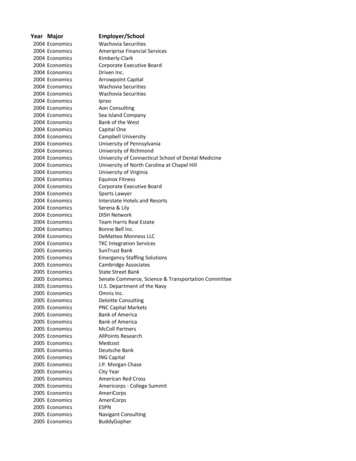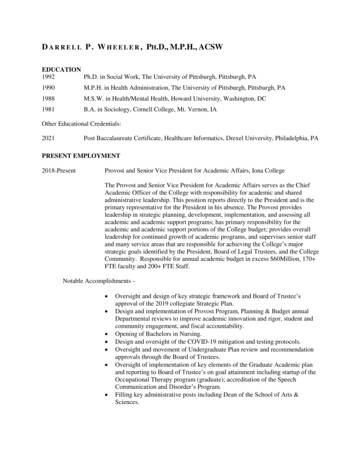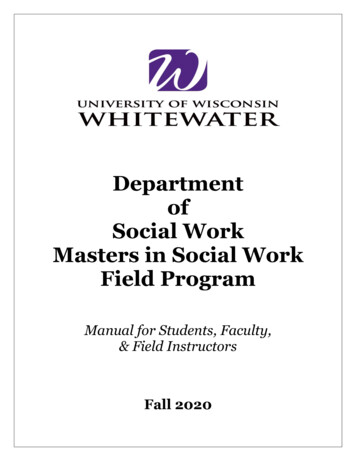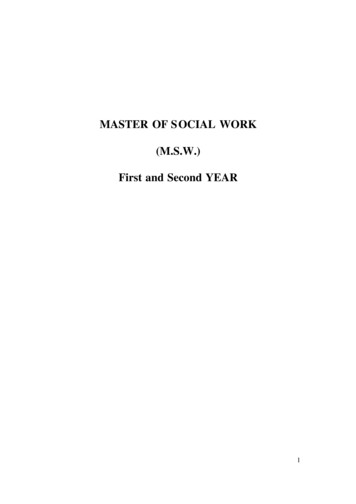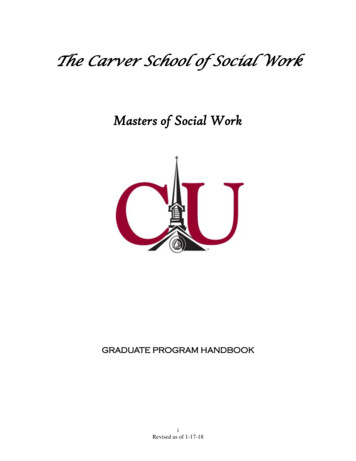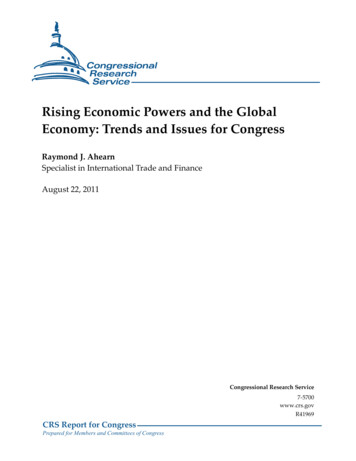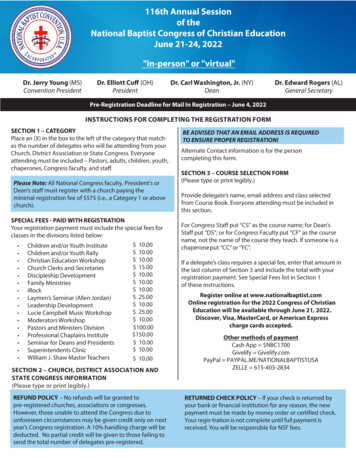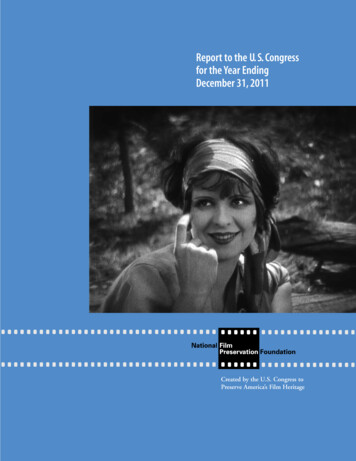
Transcription
June 2005President’s Message. 2Social Work Congress 2005Officers’ Reports. 3Coming Together of the ProfessionGWSCSW Elections.4Margot Aronson, LICSWDC Confidentiality.5Other States in the News.7News from CSWF, CSWI.8Legislative News. 10CareFirst Watch Coalition. 18Elma Kahn Wolf. 20Reflections. 22Out & About. 23Committee Reports. 24Welcome New Members. 25Our Online Society. 26GWSCSWEnd-of-YearCelebration(aka Annual Meeting)Friday, June 106:30–9:00 PMAt the Capitol Hill Homeof Nancy LithgowWine MusicDinner BuffetToasts TributesDoor PrizesFor more information see page 28www.gwscsw.orgor call GWSCSW at 202-537-0007Being in the right place at the right time — that is, living in DC — I was askedto participate in the recent “Social Work Congress 2005” as representative ofthe Clinical Social Work Federation (CSWF). This “Coming Together of the Profession” on March 17 and 18 was an ambitious working meeting: several hundred social work leaders from all over the country. Convened by the NationalAssociation of Social Workers (NASW) and a few other organizers, the Congressbrought together representatives of some forty-five social work organizationsto the Wardman-Park Marriott to consider how social work can best address thechallenges of the next decade.The two days of meetings were intense, with an elaborate mixture of plenarysessions, facilitated breakout sessions, and small group discussions, punctuated frequently by vote taking and regrouping. The result, at the close of theCongress on Friday afternoon, was the endorsement by participants of twelvespecific “imperatives for action.”A vision statement for the profession prepared by the conference convenersset the Congress in motion: “Social work expertise is highly valued for helping the global community protect and advance the well-being of all people, atevery stage of life.” There was general agreement that, though our vision is tobe so valued, the lack of public understanding of our profession is pervasive,and misunderstanding often leads to lack of respect for and even disrespect forthe contribution of social workers to society.Earning our place on the planetIn her keynote address, journalist and author Anna Quindlen, speaking on socialpolicy and activism, related her admiration for social workers: “you are earningyour place on the planet.” She emphasized how very important it is to use thepower of publicity, and urged us to think about doing “not just the right thing,but the smart thing.” She also stated that using the internet for informationsharing is imperative.There followed a brainstorming session to conceptualize the key challengesfor the profession. The concerns ranged from broad issues of social justice tolow salaries and stressful working conditions. With that base for discussion, webroke into four practice areas — Children & Families, Aging, Behavioral Health,and Health & Health Disparities — to frame the substantive issues and identifygoals. What was developed in those sessions was then reconsidered in termscontinued on page
Greater Washington Societyfor Clinical Social Work, Inc.President’s MessageGWSCSW Board of DirectorsMargot Aronson, LICSWPresident Margot AronsonVice President (Education) Joel KanterVice President (Development) Tricia BraunSecretary Judy RatliffTreasurer Janet DantePast President Marilyn Austin, Ex OfficioAdvisors:Pat Driscoll, Alice Kassabian, Nancy Lithgow,Audrey Thayer Walker, Karen Welscher-EnlowLiaisons to the BoardAdvocacy & Legislation:Danille Drake, Mary Lee Stein, Tybe DiamondConsortium for Psychoanalytic Research:Beth Altman & Debbie ZatzNMCOP: Sarah PillsburyEmail Host: Joel KanterRetiree Liaison: Grace LebowStudent Liaison: Lindsay ClarkeCommittee HeadsContinuing Education: Dolores PaulsonDirectory: Constance HendricksonEthics: Robert FentonMembership: Melinda SalzmanMentor: Kate ScharffNewsletter: Diana SeasonweinOutreach: Tybe Diamond & Susan PostReferral Panel: Eileen Ivey & Patricia Garcia Golding—— ——GWSCSW NEWS & VIEWSDiana Seasonwein, EditorMargot Aronson, Tricia Braun, Mary Lee SteinAdvertising Manager: Carol SantucciNews & Views is published four times a year:March, June, September and December. Thedeadline to submit articles and advertising isthe first of the month prior to publication .Op-ed articles expressing the personal viewsof members on issues affecting the social workprofession are welcome and will be publishedat the discretion of the editorial board. Lettersto the Editor may also be submitted. Maximumlength for these articles is 300 words.Signed articles reflect the views of the authors;publication does not in any way constitute endorsement or approval by the Greater Washington Society for Clinical Social Work.For advertising rates see page 31The next issue will be publishedSeptember 2005 and the deadline is July 29.Please email all text for publication as anMS Word attachment to gwscsw@yahoo.comContents copyrighted 2005 June 2005What a privilege it has been to serve as your president! In this my finalPresident’s Message, there is so much I want to say.When I began three years ago, the challenge of bringing the Society backto its feet had already been met, under Marilyn Austin’s presidency. Therewas a base to build on and a stalwart crew of longtime loyalists preparedto do whatever it took, but GWSCSW was far from stable, and there wasmuch to be done.There still is. But, thanks to your board’s creative energy and hard work(plus Janet Dante’s expert eye watching the treasury), stability is no longeran issue. Instead, the goal is to establish the Society’s leading role in themental health community. And we are gaining momentum.The Society now numbers close to five hundred members, and growing.And (with thanks especially to Tricia Braun, Melinda Salzman, Maurya Brennenman, Kate Scharff, and Joel Kanter), we’re reaching out to students andnew graduates. GWSCSW goes to our local social work schools for orientations, for job fairs, and, just this spring, for graduations, with the GiftCertificates for Graduates program (see page 3.) Through an AmbassadorProgram, now getting off the ground, new members will be welcomedand made comfortable, and the newly revitalized Mentor Program will behelping ease new clinicians into the profession.Leadership in Education, Advocacy, and CommunityI’m so proud of this Board’s work: it would take pages to fill you in on allthat’s been done, let alone all that’s in the planning stages. Just a fewexamples:Education continues to be a lynchpin of the Society: clinical social workers teaching clinical social workers. This April, our fine quarterly dinnermeetings and workshops (thank you, Joel Kanter!) and annual rosterof excellent continuing education courses (thanks to Dolores Paulson’sEducation Committee) were topped by a spectacular annual conferencefeaturing social work ethics guru Frederic Reamer. (A round of applausefor organizers Connie Hendrickson, Dolores Paulson, Alice Kassabian, andAudrey Walker.)GWSCSW has assumed leadership in advocacy in the District, organizing a briefing (thank you, Mary Lee Stein) for others in the mental healthcommunity on the CareFirst’s unmet obligations, and testifying beforethe DC Insurance Commissioner. We’ve played an active role in the Maryland Legislative Council for Social Work Organizations, and worked withthe Maryland Society to keep it going after NASW-Maryland pulled out;we’ve continued to share support for a lobbyist in Richmond with the Virginia Society; and we have the beginnings of a GWSCSW legislative panelof members who review bills relating to their specialties for the Counciland lobbyists.GWSCSW News
What else is there to brag about? Our GWSCSW community is flourishing: Our quarterly newsletter, withits spiffy new name and look, wins kudos for quality (thanks to Diana Seasonwein) and keeps us up todate with the profession and with our colleagues. TheAnnual Directory (Connie Hendrickson’s baby) helpsus network with one another. Our Referral Panel provides a community service that now (thanks to EileenIvey and Patricia Garcia-Golding), is available not justto individuals who call the help line, but to medicalgroups, hospitals, and Social Services, and is about todebut on the web (with help from—yes, again—JoelKanter) with individual web-pages for each panelist.Unquestionably our website, www.gwscsw.org, coulduse a facelift, but we keep it updated on a monthlybasis.Can “herding cats” be satisfying ?Throughout these three years, even the process ofgetting things done has been enriching. It has beensaid that chairing a Board meeting is like “herdingcats,” and our GWSCSW board meetings are not theexception. But I have relished our lively meetings,and revel in the accomplishments of our thoughtful,enthusiastic, and hardworking Board.Some say that heading any volunteer organization isa thankless job; my experience, though, is otherwise.In turn, I want to thank you all—members, committee chairs and members, advisors, and officers—for allyou have done to make these three years fly by.I have learned immeasurably from you all—from yourvarious approaches to social work, from your expertise in practice issues, your knowledge of the clinicalcommunity, your understanding of ethics, and yourideas for making the Society a collegial professionalcommunity. I treasure the time we have spent, and thefriends I have made.As I look to the future, serving as past president—asa consultant to the board—strikes me as ideal: a littleclinical practice, a little Society work, some trips withhusband Ed (thanks for your patience, sweetie), and lotsof time with the grandchildren and the garden. I amconfident that the next president will continue theprogress and that the Society will enhance its place ofprominence in the mental health community.Thank you all! vGWSCSW NewsVice President’s ReportJoel Kanter, LCSW-CWelcome New MSWs!GWSCSW is welcoming graduating MSWs to ourprofessional community by offering them a 50 giftcertificate to any of our educational programs in thecoming years.Both Virginia Commonwealth University (VCU) andthe Catholic University of America (CUA) have collaborated with us in delivering these certificates to theirgraduates and we hope to work with the other MSWprograms in the coming year.The 50 gift certificate can be used toward a GWSCSWContinuing Education class, dinner meeting, workshop or conference. It also can be used as a discountfor Society membership, but membership is notrequired for taking advantage of the certificate; theemphasis is on education.If you know of any graduating MSWs from programsother than VCU or CUA, please send their names,addresses and email addresses to the Society atgwscsw@yahoo.com; we will mail them each a gift certificate in honor of their accomplishment.Referral Panel Website and WebpagesThe Referral Panel website should be up and running before the end of June. Its address will be www.metrotherapy.info and it will link interested parties to the individual websites of over 60 participating members in this program. Interested parties willbe able to search for clinical social workers based onlocation, populations served, insurance accepted andother considerations.We plan to advertise this site on the Internet and useother promotional tools to inform potential referral sources of the website. Once in operation, we willopen participation to other members who have notpreviously signed up. vBe on top of what’s happeningin your Society and your profession.SIGN UP FOR THE GWSCSW LISTSERVEMAIL YOUR REQUEST TO:gwscsw@yahoo.comJune 2005
GWSCSW toElect New BoardMarilyn Austin, PhDInternational Psychotherapy InstituteIPICouple and Family Therapy InstituteJuly 11-16, Bethesda, MDThe one thing that is certain in this world of ours—according to a well-known pundit—is change!EXPLORING DESIRE AND ENVYIN COUPLES AND FAMILIESSo, change is upon us and it is time to elect anotherslate of officers. Margot has been a wonderful, inspiring and hard working President, but she deserves arest, after three years in that position. She has servedabove and beyond our tradition of two years in anelected office.Implications for Coupleand Family TherapyOur two-year tradition may have come about as a wayto pass the opportunities around. But in addition, it isgood to have fresh faces, energies and ideas in orderto keep the Society alive and vibrant as a professionalorganization.It is clear that we have a solid base of clinical socialworkers who are interested in having a visible professional group with which to identify. Considering thatwe almost folded our tents and slipped away into thenight only four years ago, we now have close to 500members, educational and social events, conferencesand a political voice in our three jurisdictions.The slate of officers to be elected by the June 10, 2005meeting include Diana Seasonwein as President; JoelKanter as Vice President for Education; Tricia Braun asVice President for Development; Janet Dante as Treasurer; and Cecilia McKay as Secretary. Nancy Lithgow,Pat Driscoll and Beth Altman will be Advisory Boardmembers.Ballots should be returned to the GWSCSW office at5028 Wisconsin Avenue NW, #404, Washington 20016,by June 8, 2005.GWSCSW Past President Marilyn Austin chaired the NominationsCommittee this year.VOLUNTEERS!GWSCSW needs you!No matter how small the amount of timeyou have, we can use you!Please call GWSCSW at202-537-0007 June 2005Develop more effective therapeutic interventionsand a deeper understanding of the influence ofthe affects of desire and envy on mutuality andconnection in couples and families.Faculty include:David Scharff, MD, Jill Scharff, MD,Carl Bagnini, LCSW, Norma Caruso, Ph.D.Michael Kaufman, LPC and others.ŏ Lectures ŏ Video ŏ Clinical Presentationsŏ Film and Discussion ŏ Small group processCE credit available(approximately 32 hours).Registration fee 920 ( 960 after May 31)Information: contact Institute Chair Michael Kaufman,LPC, 202-973-0175. To register call IPI at 301-215-7377.Infant Massage ClassesInfant Massage, a “language” for parent-child bonding, maynow be learned in four one-hour sessions with a CertifiedInfant Massage Instructor. (The instructor demonstrates with adoll; only the parents actually touch their child.)Infant Massage classes gives parents a tangible sense oftheir own power to soothe, comfort and nurture their babies.It teaches how to read the cues their babies are using toexpress their emotions, and how to engage in loving, tensioneasing patterns of touch. Parents report that after a massage,their babies sleep better, have an easier time with feeding,and experience fewer stomach upsets.Studies show that a regular program of infant massage can Relieve baby’s tension Improve baby’s digestion Increase muscle tone and coordination Stimulate circulation Stimulate nervous system and brain functioning Stimulate the immune system Promote longer and deeper sleep patternsThe touch in Infant Massage communicates love and acceptance, helping the child’s emotional and physical growth.Eunice Dubuque-AronsonPresident, Greater Washington Chapter,Association for Infant Massage, International (AIMI)Certified Infant Massage Instructor301-728-6281GWSCSW News
D.C. ConfidentialityDanille Drake, PhDWith a good deal of work behind us, it does appear that a consensus hasbeen reached that will uphold the DC law to safeguard patient confidentiality on routine claim review forms to be used by insurers in the District.Our most recent meeting at the office of DC Insurance CommissionerLarry Mirel included as before, representatives from the major insurancecarriers along with a representative from clinical social work, psychology,psychiatry, and licensed professional counselors. To the great relief of all,we refined a working draft of a form to be used for routine outpatientmental health claims.Holding to the strictest interpretation of the DC Mental Health Act, thisform requests limited information as allowable under the law. We willhave one final meeting with attorneys present, to ratify this draft of aroutine claim review form. Given that all parties have worked closely inconsultation with legal counsel throughout this process, it is expectedthat the form will be published to replace those currently in use by thirdparty payors.Because of the complexities of our three jurisdictions in which policiesare written, patients and clients reside, and clinicians practice, Mr. Mirelwill begin to work with Maryland’s insurance commissioner in an attemptto define and resolve some contradictions in DC and Maryland’s respective laws governing confidentiality.One question that has arisen is whether the practitioner is in violationof DC law if he or she provides more information to a third party payorthan is stipulated in the law. Since the information belongs to the patient/client, they are at liberty to request it from the therapist and submit itthemselves, if they wish, to their insurer. A catch here, is the ethicaldilemma concerning this patient/client’s prerogative, that may conflictwith what, in the therapist’s best judgment, may be considered harmfulto the patient, if additional information is made available. The law does,however, protect private notes that are not part of the official medicalrecord.Once the final version of the claim review form is formally approved bythe Commissioner, a copy will be made available to members of the Society, either via the web or printed in the next issue of the newsletter. TheTaskforce’s next focus will be to clarify and define the concept of Independent Review. vGWSCSW Book CornerComing soon—the GWSCSW Book Corner! A number of our members havewritten books or book chapters, and we’d like to feature one or more of thesepublications in our News & Views and on our website, www.gwscsw.org.Please contact us with information about your publications (or those of yourtoo-modest colleagues!) at Newsletter Book Corner, gwscsw@yahoo.com.GWSCSW NewsLetterFrom the EditorDiana SeasonweinChange is difficult for me. But Ihave finally come to accept thatchange is inevitable. And here atthe Society, we have some changesin store. Margot Aronson will bestepping down from her very successful and productive three yearrun as president. And what anamazing three years it’s been!When Margot began her presidency, I was living in Prague. But Icontinued to receive the newsletter, and I could see the excitementbuilding in the Society. When Ireturned from Prague, Margot persuaded me—and she is extremelyskillful at persuasion—to becomenewsletter editor. After manyentreaties, I agreed.I have blushingly accepted themany kudos for putting out a finenewsletter, but I could not havedone it without Margot’s help,and patience. I know Margot doessleep, because sometimes whenwe were working on the newsletter, she would say that’s it, I’m goingto bed now. I don’t know how shehas accomplished all that she hasand slept too. She has been a fine,energetic, cheerleading, creativeand enthusiastic president. Justwhat the doctor ordered to meetthe needs of the Society. She willbe a tough act to follow, and I willsorely miss our frantic last minute(close to midnight) collaborations to put the newsletter to bed.Margot, congratulations on a jobsuperbly done. vDID YOU KNOW An Amazon.compurchase made via the GWSCSW websiteresults in a contribution to your Society!June 2005
Social Work Congress, continued from page of Education, Research, Practice, and Policy needs,before the final imperatives were determined.The Congress provided an extraordinary opportunityfor participants to share ideas and compare experience with social workers across the professionalspectrum. There was little sense of the old genericvs. clinical conflict. However, some participants camewith an agenda, e.g., pushing for more professionalemphasis on issues of aging, or substance abuse, orresearch, or opportunities for BSWs. Those concernedwith ongoing racism in the profession were particularly outspoken and well organized.Strategy teams will complete the workThe Imperatives(As adopted at Socia l Work Congress 2005, March 18, 2005) Assure excellence in aging knowledge, skills,and competencies at all levels of social workeducation, practice, and research. Participate in politics and policy where majordecisions are being made about behavioralhealth. Assure a qualified social work labor force toserve children. Take the lead in advocating for quality uni-versal healthcare.The goal of the Congress was to develop the underpinnings for a common agenda and action plan forthe social work profession over the next decade. Obviously, two days is insufficient for such a task, and theimperatives themselves are still in very rough form.Over the next months, strategy teams composed ofCongress participants will develop possible actionplans to advance each of the imperatives. Elevate the public’s awareness of the effi-NASW plans to hold a major press conference whenthe work of the Congress is complete. The action planis intended for use by all participating organizationsto guide efforts in practice, education, and researchand to lobby with local, state, and national level policymakers who are responsible for decisions aboutprogram structures, service delivery systems, andfunding. Increase the value of social work by raisingcacy and cost-effectiveness of social workpractice in healthcare. Address the impact of racism, other formsof oppression, social injustice, and otherhuman rights violations through social workeducation and practice.standards and increasing academic rigor ofsocial work education programs. Mobilize the social work profession toactively engage in politics, policy, and socialaction, emphasizing the strategic use ofpower. Continuously acknowledge, recognize, con-Conference conveners: NASW, Partners and CosponsorsNASW’s partners in convening the Congress were theCouncil on Social Work Education, the National Association of Deans and Directors of Schools of SocialWork, and the Baccalaureate Program Directors. Othergroups who signed on as co-sponsors were: the Groupfor the Advancement of Doctoral Education, The Institute for the Advancement of Social Work Research,the Association of Oncology Social Work, and theSimmons College School of Social Work. Given current fiscal concerns, CSWF declined the opportunityto participate as a partner or co-sponsor, but activelyparticipated in the meetings and the decision-makingprocess. v June 2005front, and address pervasive racism withinsocial work practice at the individual, agency,and institutional levels. Strengthen social work’s ability to influencethe corporate and political landscape at theFederal, state, and local levels. Promote culturally competent social workinterventions and research methodologiesin the areas of social justice, well-being, andcost-benefit outcomes. Connect research and practice through part-nerships among researchers, the field, andcommunities.GWSCSW News
New Jersey Society—’Not On Our Watch!’When the New Jersey Society for Clinical Social Work(NJ-SCSW) learned that Horizon, the local NJ BlueCrossBlueShield, was providing subscribers with coveragefor psychotherapy with a social worker only if thatLCSW was supervised by an MD, they saw red. Afterall, NJ-SCSW (like our own Society) was establishedback in the ‘70s to seek licensure as a response, inlarge measure, to the requirement for supervision bymedical professionals.The NJ-SCSW first step was to contact Guild 49, theclinical social work arm of the Office & ProfessionalEmployee International Union (OPEIU), for assistancein setting up a meeting with Horizon. On March 24,Luba Shagawat, NJ-SCSW Board member and GuildChair, and Mike Goodwin, President of the OPEIU, metwith representatives of Horizon and their managedcare affiliate Magellan to present the case for dropping this offensive policy.Ms Shugawat argued that LCSWs do not requiresupervision because they are specialists in the field ofmental health and indeed provide 60% of all mentalhealth treatment in the country; that the New JerseySocial Work Licensing Act of 1991 does not requireLCSWs to be supervised; that since social workerstend to collaborate when there is a need, the requirement for supervision by an MD may actually increasecosts to Horizon; and that unless a supervising MD isa psychiatrist or has other training in psychotherapy,Horizon may actually be jeopardizing treatment.NJ-SCSW is optimistic about a resolution and will keepus posted. vFederation to the RescueThreat to DelawareSociety CEUsEarly this spring a public hearing was held at the Delaware Board of Social Work Examiners. One of the issuesunder discussion, Delaware Society for Clinical SocialWork (DE-SCSW) president Gail Levinson discovered,was a new rule limiting the right to pre-approve socialwork continuing education courses held in Delawareto NASW, ASWB and APA.Ms. Levinson quickly contacted the Clinical Social WorkFederation (CSWF). Within a week, CSWF ExecutiveDirector Richard Yanes, CSWF president Abbie Grant,and CSWF Education Chair Ann Segall presented Delaware’s Board of Social Work Examiners with an outline of the long-established formal process for CSWFreview of continuing education courses for the granting of CEU credit and a request for reconsideration,.At the next Board of Social Work Examiners meeting,CSWF was added as a fourth approved CEU authorizer;a public hearing is in the works.CSWF also helpfulwith DE Freedom ofInformation ActEfforts to market, do research, and solicit membersfor the Delaware Society have been stymied by theDelaware Division of Professional Regulation, whichputs the addresses of professionals off limits. Afterresearching the Delaware Freedom of InformationAct, Mr. Yanes has developed language to serve as astarting point for DE-SCSW and several similarly frustrated Delaware organizations to push for a legislativechange. vDid You Know ?Mental Health SpendingIn a report issued in March, the U.S. Department ofHealth and Human Services (HHS) estimated in 2001that 63% of all mental health spending came frompublic sources compared to 45% of spending for otherhealth disorders. Among the public source payers,Medicaid was the largest source of funding, accounting for 27% of the mental health spending. And morethan half of the public dollars spent on mental healthare managed by the states and local jurisdictions.GWSCSW NewsFor a copy of the report, National Expenditures forMental Health Services and Substance Abuse Treatment 1991-2001, contact the Substance Abuse andMental Health Services Administration (SAMHSA).Their web site is www.samhsa.hhs.gov . vThanks to Richard Yanes, Executive Director of the Clinical SocialWork Federation, for compiling this information.June 2005
CSWFThe Clinical Social Work FederationRichard YanesA Federation priority this year has been building ourmembership base; the board has set a goal of 10%increase in each society’s membership for 2005. Louisiana is reporting close to 20% increase already; othershave reached or are close to 10%. CSWF membershipchair Margie Howe has provided societies with consultation, training, and a membership development planformat that can be individually tailored for a society’sneeds.Current states without a state society who fall underthe status of Unaffiliated Member States are Michigan,Florida, Massachusetts, and New Hampshire. Nevadahas formed a steering committee for creating aNevada Society, with initial efforts to be concentratedin the Las Vegas area.Making changes in state legislation andregulationsThe CSWF National Licensure Standards project isprogressing under the leadership of Laura Groshong,the Federation’s Government Affairs Committee chair,and the work group hopes to have a preliminary draftready for consideration at the October 2005 Boardmeeting.Meanwhile, the Unaffiliated Members in Michigan areworking on the regulations to support their recentlyadopted licensing legislation. Laura and Anne Segall,chair of the Federation’s Education Committee andmanager of the Federation’s CEU program, are working on continuing education and governmental affairsissues with an ever-expanding coalition of Unaffiliated Members, professionals, and professional organizations.Among the State societies, Pennsylvania is looking atlanguage that would more clearly define the practiceof clinical social work by specifically defining the ability to practice psychotherapy and to diagnose emotional disorders. Laura has been providing technicalassistance.The New Jersey Society has moved its loss-ratio insurance bill out of the Assembly and has recently seen itintroduced in their state Senate. (The loss-ratio refers June 2005to the percentage of the total premiums to be spenton direct service rather than administrative costs,executive salaries, dividends, etc.)The Delaware Society, with Federation consultation, iscollaborating with other mental health professionalorganizations to introduce legislation forcing theirstate licensing boards to make lists of licensed professionals available for education purposes, with a oneyear phase-in to allow professionals to secure a publicmailing address if they do not already have one.Delaware also requested Federation interventionwhen their right to offer continuing education creditwas threatened. Anne and Abbie Grant, CSWF president, quickly put together documentation that convinced the licensing board to include the Federationas a CEU provider. (Ed note: see page 7 for more on theseDelaware Society projects.)Richard Yanes is executive director of the Clinical Social Work Federation.
Both Virginia Commonwealth University (VCU) and the Catholic University of America (CUA) have collab-orated with us in delivering these certificates to their graduates and we hope to work with the other MSW programs in the coming year. The 50 gift certificate can be used toward a GWSCSW Continuing Education class, dinner meeting, work-
